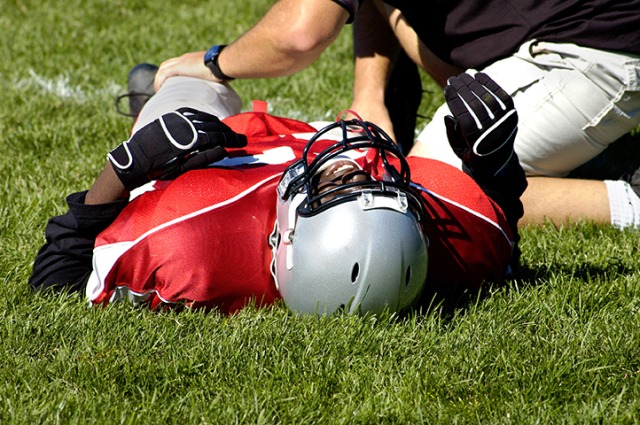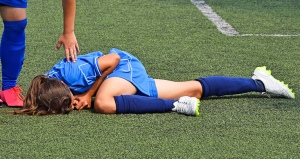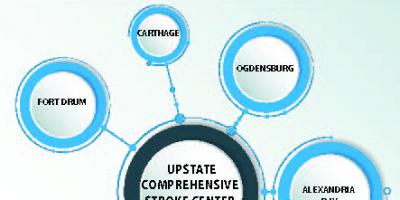Concussion concerns: Make sure you know how to react

It's crucial that an athlete suspected of having a concussion not return to play until he or she has been evaluated.
An injured athlete needs to be removed from play until he or she is properly evaluated. Symptoms vary but may include blurry vision, ringing in the ears, headaches, trouble with balance and/or concussion. Most concussions happen without the athlete losing consciousness.

Brian Rieger, PhD
The recovery period is typically three weeks and includes a lot of sleep and rest. Patients are instructed to limit their physical and mental exertion, which for students usually affects school attendance and the use of electronic devices. Athletes are usually sidelined, to protect them from the risk of re-injury.
“A concussion is almost always a short-term event, when managed properly,” says Brian Rieger, PhD, an assistant professor of physical medicine and rehabilitation and director of the Upstate Concussion Center.
He says one thing coaches and parents can do is encourage athletes to be honest about their injuries.
Ignoring the symptoms of a concussion is bad because it can delay healing.
What‘s worse is to overlook a concussion -- and then suffer another. The consequences can be disastrous when that happens, Rieger says, with symptoms more severe and lingering for months or years.
5 reasons athletes with concussions should not play

A concussion is usually a short-term event when it is properly managed. Ignoring the symptoms of a concussion can delay healing.
With proper management, the majority of concussions are short-term injuries. But, it‘s crucial that an athlete suspected of sustaining a concussion not return to play until he or she has been evaluated.
An athlete with a concussion who continues to play:
* increases the risk of sustaining another concussion;
* is liable to aggravate concussion symptoms including fatigue, dizziness, blurred vision, irritability, anxiety, depression, headache, nausea and vomiting, clumsiness, fogginess, trouble reading and poor mental stamina;
* might prolong his or her recovery time with associated medical, psychological and academic difficulties;
* increases the risk of long-term problems which could include headaches, cognitive and emotional changes and sleep difficulties; and
* in rare cases, risks severe disability or death if he or she sustains another concussion.
The Upstate Concussion Center (315-464-8986) provides comprehensive evaluation and treatment services for concussion and sports concussion. Click here to learn more.

 This article appears in the fall 2016 issue of Upstate Health magazine. Click here for a radio interview/podcast with Rieger about the latest concussion information, including diagnosis and management, here for an interview about protecting skiers and skaters from concussions and here for an overview of sports-related concussions, including myths and symptoms.
This article appears in the fall 2016 issue of Upstate Health magazine. Click here for a radio interview/podcast with Rieger about the latest concussion information, including diagnosis and management, here for an interview about protecting skiers and skaters from concussions and here for an overview of sports-related concussions, including myths and symptoms. 

